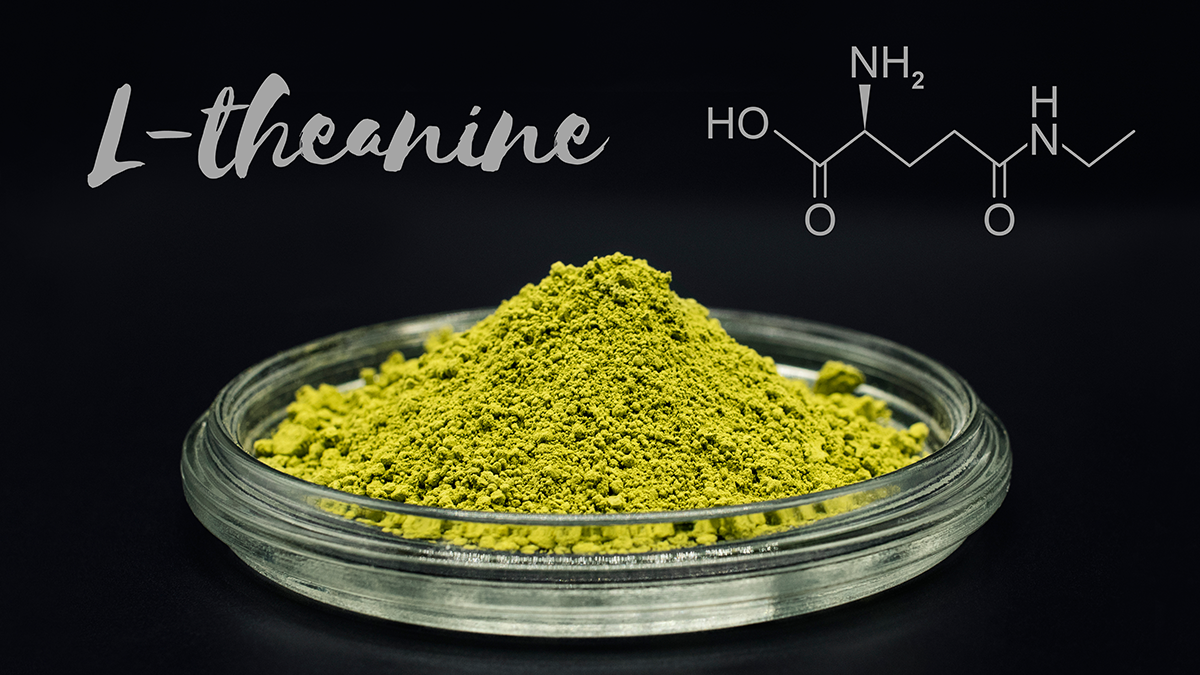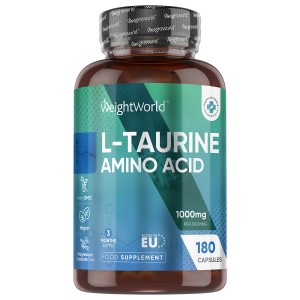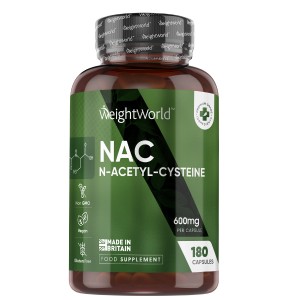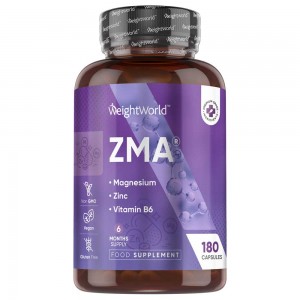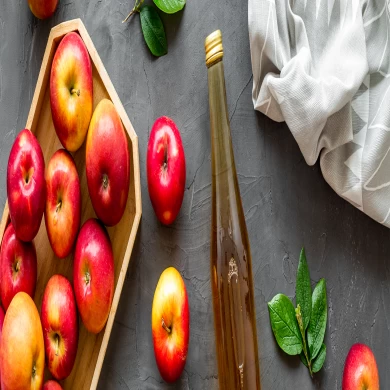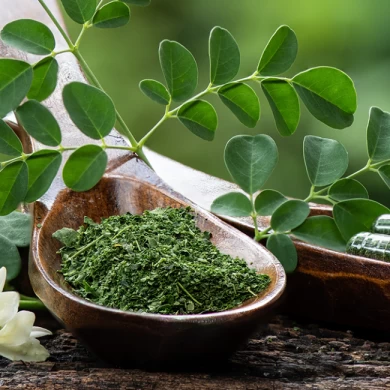All-Natural Supplements
GMP-certified and GMO-Free
Free UK Delivery
Enjoy free shipping on orders above £35
100% Customer Satisfaction
We offer a full 90-day money back guarantee
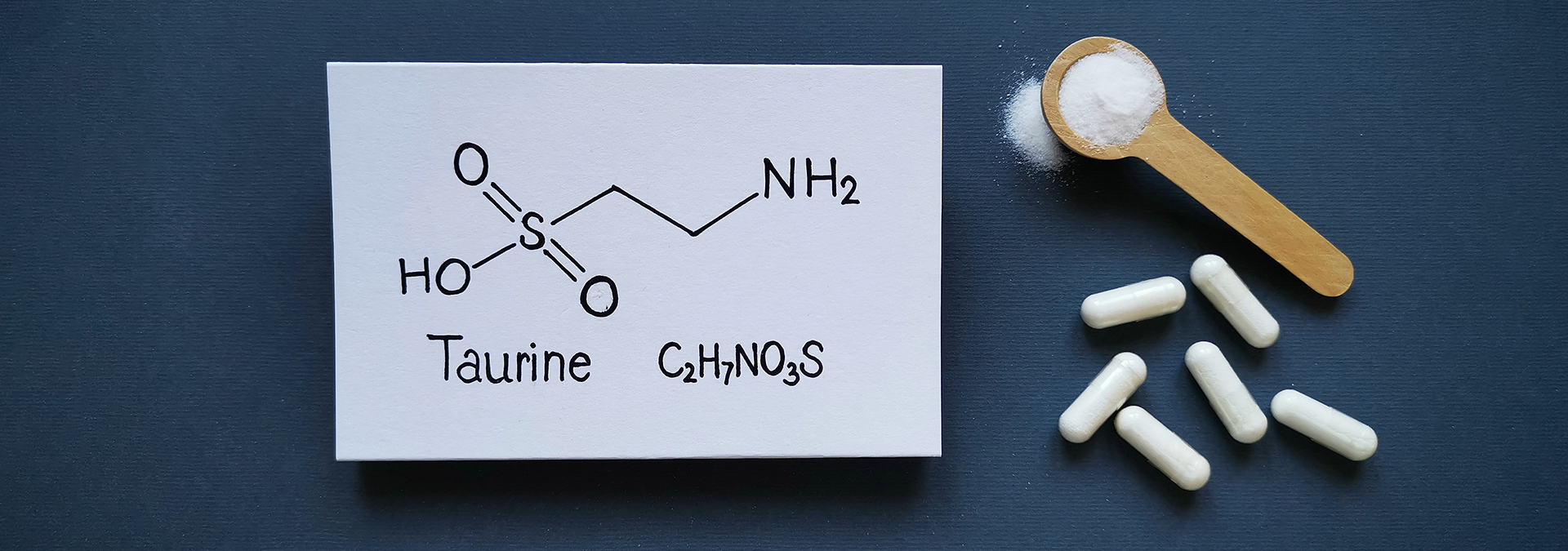
Diet and Nutrition
Your Ultimate Guide to Theanine: Benefits, Sources and Side Effects
10 Min. Read 24 Oct 2024
On this page
- What Is L-Theanine?
- What Does L-Theanine Do?
- Benefits of L-Theanine
- Does L-Theanine Make You Happy?
- How Does Theanine Work?
- 3 Ways Theanine Helps Your Brain
- What Are the Best Sources of L-Theanine?
- L-Theanine Side Effects and Risks
- What Is a Safe Daily Intake?
- What About Theanine Supplements?
- Final Say
- FAQs
- Sources
Imagine sipping a cup of tea and feeling a wave of calm wash over you. That's not just the warm beverage working its magic - it's theanine, a naturally occurring amino acid found in tea leaves. With its increasing popularity, many are curious about the potential L-theanine benefits and uses.
This guide will take you through everything you need to know about theanine, from its origins to its impact on your brain and overall well-being.
What Is L-Theanine?
Theanine is an amino acid predominantly found in green and black tea, as well as certain mushrooms. The most common form, L-theanine, is the one most studied and valued for its potential health benefits.
L-theanine is often highlighted for its calming properties without causing drowsiness, making it an intriguing topic for researchers and health enthusiasts alike.
What Does L-Theanine Do?
L-theanine influences certain neurotransmitters in the brain, including gamma-aminobutyric acid (GABA), dopamine, and serotonin. These neurotransmitters play crucial roles in mood regulation, stress levels, and overall cognitive function. By modulating these brain chemicals, L-theanine helps foster a state of calm and alertness.
Benefits of L-Theanine
Several L-theanine benefits are well-documented through various studies and personal testimonials. Here are some of the key advantages of taking L-theanine:
1. Stress and Anxiety Reduction
Studies have shown that L-theanine can significantly reduce stress and anxiety levels. For instance, research1 published in the Journal of Clinical Psychiatry found that L-theanine supplementation reduced stress in individuals undergoing stressful situations.
2. Sleep Improvement
A study2 in the Alternative Medicine Review demonstrated that L-theanine improved sleep quality in boys with attention deficit hyperactivity disorder (ADHD) without causing drowsiness the next day. This suggests its potential for improving sleep in various populations.
3. Enhanced Cognitive Function
Research3 in the Journal of Nutritional Neuroscience has shown that L-theanine can improve cognitive function, particularly when combined with caffeine. This synergy enhances attention, focus, and overall mental performance.
4. Mood and Relaxation
L-theanine’s ability to modulate neurotransmitters is well-documented. A study4 published in the Journal of Functional Foods highlighted how L-theanine consumption led to increased alpha brain wave activity, promoting relaxation and a sense of well-being without sedation.
5. Immune System Support
Evidence from research5 suggests that L-theanine can enhance the immune system by boosting the production of T-cells, which are critical for the body’s defence against pathogens.
6. Cardiovascular Health
One of the most notable L-theanine benefits is heart support. A study6 found that L-theanine can help reduce blood pressure in individuals subjected to stressful conditions, supporting its role in cardiovascular health management.
In short, there is a wide range of L-theanine benefits that contribute to both mental and physical health.
Does L-Theanine Make You Happy?
While L-theanine is not a direct mood enhancer like some medications, its ability to reduce stress and promote relaxation can contribute to an overall sense of well-being. By reducing anxiety and improving sleep, L-theanine indirectly supports a more positive mood and better mental health.
How Does Theanine Work?
The mechanism of L-theanine involves its impact on neurotransmitters and brain wave activity. Here's a closer look:
- Neurotransmitter Modulation: L-theanine increases the levels of GABA, dopamine, and serotonin, which help regulate emotions and stress responses.
- Alpha Brain Waves: L-theanine promotes alpha brain wave activity, associated with a relaxed but alert mental state, similar to what is experienced during meditation.
3 Ways Theanine Helps Your Brain
L-theanine supports your brain in the following ways:
1. Reduces Stress and Anxiety: By increasing calming neurotransmitters, L-theanine helps reduce anxiety and promote relaxation without sedation.
2. Enhances Cognitive Function: Improved focus and concentration can be attributed to the modulation of brain wave activity and neurotransmitter levels.
3. Improves Sleep Quality: Better sleep quality is achieved without the risk of dependence or next-day drowsiness, making it a safe option for those struggling with sleep issues.
Always consult a healthcare professional for the appropriate L-theanine dosage for anxiety, cognitive support and sleep quality.
What Are the Best Sources of L-Theanine?
L-theanine is most commonly associated with tea, but there are several sources where this beneficial amino acid can be found. Here’s a detailed look at the best sources of L-theanine:
1. Green Tea
Green tea is one of the richest sources of L-theanine, which contributes to its well-known calming effects. The leaves of Camellia sinensis, the plant from which green tea is made, contain significant amounts of L-theanine. Drinking green tea not only provides L-theanine but also other antioxidants and nutrients that support overall health.
Benefits of Green Tea:
- High L-theanine content
- Rich in antioxidants like catechins
- Low in caffeine, making it a great choice for relaxation
2. Black Tea
Black tea also contains L-theanine, though in slightly lower amounts compared to green tea. The fermentation process that black tea undergoes does not significantly diminish its L-theanine content, allowing it to retain its calming properties.
Benefits of Black Tea:
- Moderate L-theanine content
- Contains theaflavins, which are potent antioxidants
- Provides a more robust flavour and higher caffeine content compared to green tea
3. Oolong Tea
Oolong tea, which is partially fermented, contains levels of L-theanine that are between those of green and black tea. This makes it a balanced option for those who enjoy the flavour of both green and black tea but want to benefit from L-theanine.
Benefits of Oolong Tea:
- Balanced L-theanine content
- Offers a unique taste profile that is both floral and fruity
- Contains polyphenols that may aid in weight management
4. White Tea
White tea is the least processed of all tea types and contains a moderate amount of L-theanine. It has a delicate flavour and is high in antioxidants, making it a popular choice for health-conscious individuals.
Benefits of White Tea:
- Moderate L-theanine content
- High in catechins and other antioxidants
- Mild, delicate flavour
5. Matcha
Matcha is a powdered form of green tea that is especially rich in L-theanine because it uses the entire leaf. This makes matcha one of the most potent sources of L-theanine. Consuming matcha provides a concentrated dose of this amino acid along with other beneficial compounds.
Benefits of Matcha:
- Extremely high L-theanine content
- Provides a sustained energy boost due to its balanced caffeine content
- High in chlorophyll and antioxidants
6. Certain Mushrooms
Although less common, some mushrooms, such as Boletus badius, also contain L-theanine. These mushrooms are not as readily available as tea but can be included in the diet for a varied source of L-theanine.
Benefits of Mushrooms:
- An alternative source of L-theanine for those who do not consume tea
- Contains other nutrients and compounds beneficial for health
7. L-Theanine Supplements
For those looking to ensure a consistent and measured intake of L-theanine, supplements are a convenient option. Available in various forms such as capsules, tablets, and powders, these supplements provide a reliable source of L-theanine.
Benefits of L-Theanine Supplements:
- Precise dosing for tailored intake
- Easy to incorporate into daily routines
- Available without the need to consume large amounts of tea
Wondering what other benefits teas offer? Click here to find out!
L-Theanine Side Effects and Risks
L-theanine is typically regarded as safe, with very few reported side effects. Nevertheless, some of the potential L-theanine side effects and risks include:
- Gastrointestinal Issues: Mild stomach upset or nausea.
- Interactions with Medications: L-theanine may interact with certain medications, particularly those affecting blood pressure and mood.
- Allergic Reactions: While uncommon, a few people might experience allergic reactions.
What Is a Safe Daily Intake?
The safe daily intake of L-theanine varies, but most studies suggest that up to 400 mg per day is well-tolerated. It's always best to start with a lower dose and gradually increase as needed, and consulting with a healthcare professional is advisable, especially if you are taking other medications.
What About Theanine Supplements?
L-Theanine Capsules: Convenient and easy to dose, these capsules typically contain 100-200 mg of L-theanine per serving.
L-Theanine Powders: Ideal for those who prefer to mix supplements into drinks or foods, allowing for flexible dosing.
WeightWorld L-Theanine Capsules - 180 Capsules 400mg
Why Choose Them?
These vegan & gluten-free capsules are perfect for relaxation and cognition.
Our satisfied customers love these capsules and have given them an outstanding 5 out of 5.
According to mrs J -
“Had a better sleep with these than my previous product. Well priced too!”
Looking for other options? We also offer premium and organic Japanese ceremonial-grade Matcha Tea for weight management & youthful skin!
Final Say
L-theanine offers a natural way to support relaxation, enhance focus, and improve sleep quality. Whether you're sipping on a cup of green tea or taking a supplement, incorporating L-theanine into your routine could provide a gentle yet effective boost to your mental well-being.
Remember to consider the dosage and potential interactions with medications, and always consult a healthcare professional if in doubt. Incorporate the relaxing L-theanine benefits into your life and discover how this simple amino acid can help enhance your overall mental well-being.
FAQs
L-theanine is best used for promoting relaxation without drowsiness. Many people appreciate the L-theanine benefits of reducing stress and enhancing focus. It is commonly found in tea leaves and supplements.
L-theanine boosts alpha brain wave activity, fostering a state of calm alertness. It also influences neurotransmitters like dopamine and serotonin, contributing to its calming effects. Understanding what L-theanine does in the brain highlights its role in mental wellness.
L-theanine side effects are generally mild and rare. Some individuals might experience headaches, dizziness, or digestive problems. It's always best to consult a healthcare professional before starting any new supplement to understand potential risks.
L-theanine may support both energy and sleep. During the day, it promotes a calm focus, and in the evening, it helps improve sleep quality. The versatility of L-theanine benefits those looking for balance in their daily routine.
Both GABA and L-theanine have their own benefits. L-theanine is known for its ability to enhance relaxation and focus, while GABA directly supports the brain's calming mechanisms. Deciding between GABA or L-theanine depends on individual needs and preferences.
L-theanine is generally considered safe for most people, including those concerned about kidney health. However, it’s important to consult with a healthcare provider to ensure it’s appropriate for your specific health conditions and to discuss any potential l-theanine side effects.
Sources
- https://www.psychiatrist.com/jcp/l-theanine-relieves-positive-activation-anxiety-symptoms/?CLICK=1
- https://altmedrev.com/blog/resource/the-effects-of-l-theanine-suntheanine%ef%9b%9a-on-objective-sleep-quality-in-boys-with-attention-deficit-hyperactivity-disorder-adhd-a-randomized-double-blind-placebo-controlled-clinical-trial/
- https://www.tandfonline.com/doi/full/10.1080/1028415X.2016.1144845
- https://www.sciencedirect.com/science/article/pii/S0022316622099126
- https://www.medicalnewstoday.com/articles/324120
- https://www.healthline.com/health/l-theanine
600 mg 180 Capsules | 600 mg 180 Capsules | For Natural Defences
600 mg 180 Capsules | 600 mg 180 Capsules | For Natural Defences

Next
On this page What Are the Top Vitamin B12 Foods? What About Vitamin B12 Supplements? Final Say FAQs Sources: Vitamin B12, also known as cobalamin, is an essential nutrient that plays a crucial role in maintaining healthy nerve cells, supporting...
Most Viewed Articles
7 Proven Health Benefits of Apple Cider Vinegar What Is Apple Cider Vinegar? What Are...
On this page What Are the Top Vitamin B12 Foods? What About Vitamin B12 Supplements?...
On this page What Is Moringa? Moringa Leaves vs Moringa Seeds: Which Is Better? 13...
